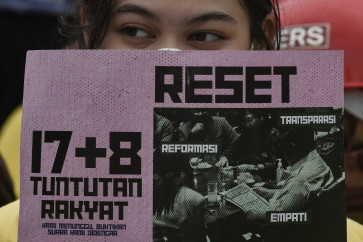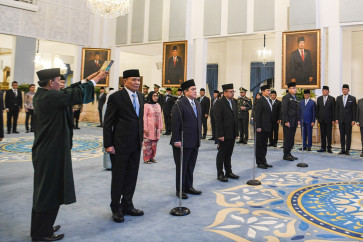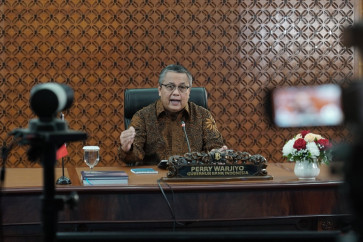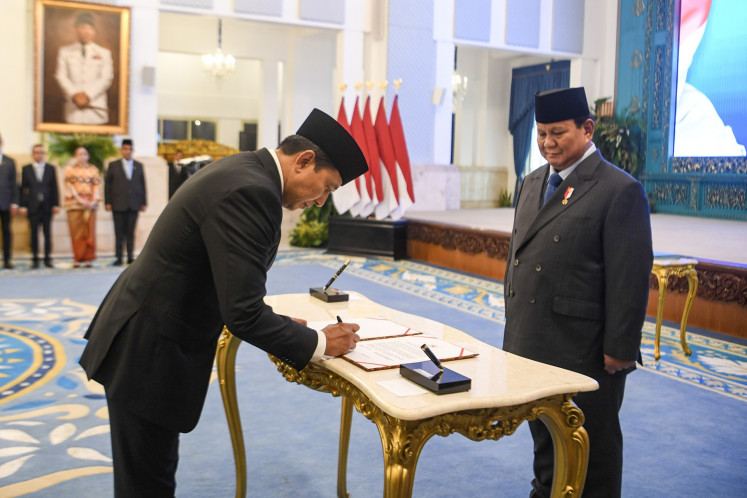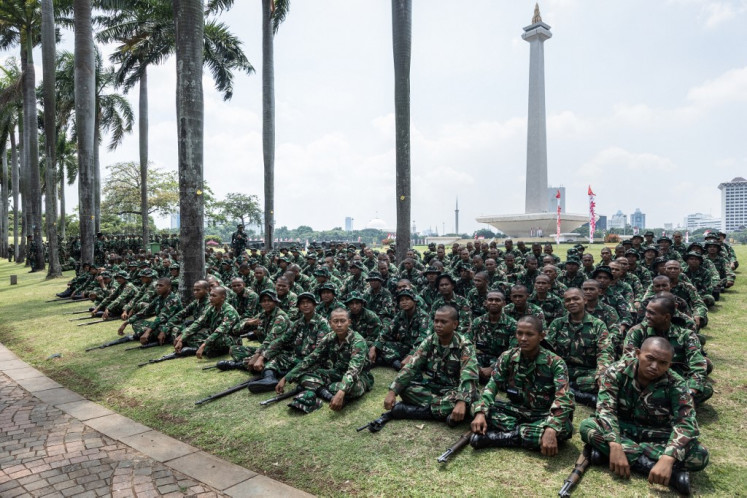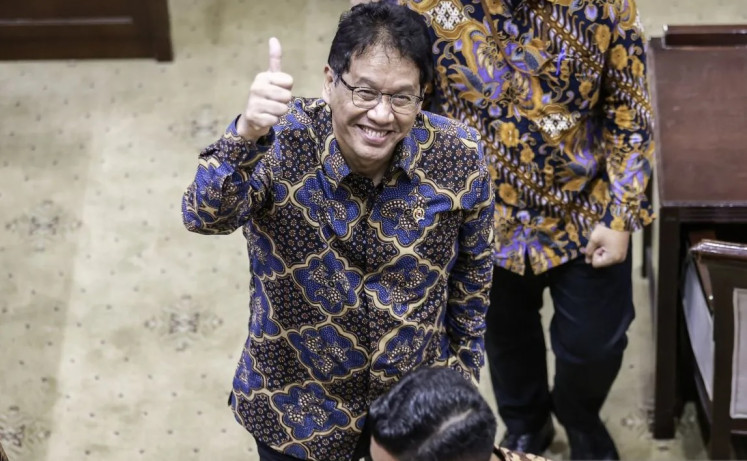Popular Reads
Top Results
Can't find what you're looking for?
View all search resultsPopular Reads
Top Results
Can't find what you're looking for?
View all search resultsFormer PBB lawmaker elected Constitutional Court chief justice
New judges: Newly elected Constitutional Court Chief Justice Hamdan Zoelva (left) and Deputy Chief Justice Arief Hidayat wave to journalists shortly after the election at the Constitutional Court on Friday
Change text size
Gift Premium Articles
to Anyone
 New judges: Newly elected Constitutional Court Chief Justice Hamdan Zoelva (left) and Deputy Chief Justice Arief Hidayat wave to journalists shortly after the election at the Constitutional Court on Friday. Hamdan replaced his predecessor, Akil Mochtar, who resigned after being charged with graft and money-laundering. (JP/Nurhayati) (left) and Deputy Chief Justice Arief Hidayat wave to journalists shortly after the election at the Constitutional Court on Friday. Hamdan replaced his predecessor, Akil Mochtar, who resigned after being charged with graft and money-laundering. (JP/Nurhayati)
New judges: Newly elected Constitutional Court Chief Justice Hamdan Zoelva (left) and Deputy Chief Justice Arief Hidayat wave to journalists shortly after the election at the Constitutional Court on Friday. Hamdan replaced his predecessor, Akil Mochtar, who resigned after being charged with graft and money-laundering. (JP/Nurhayati) (left) and Deputy Chief Justice Arief Hidayat wave to journalists shortly after the election at the Constitutional Court on Friday. Hamdan replaced his predecessor, Akil Mochtar, who resigned after being charged with graft and money-laundering. (JP/Nurhayati)
N
span class="caption" style="width: 509px;">New judges: Newly elected Constitutional Court Chief Justice Hamdan Zoelva (left) and Deputy Chief Justice Arief Hidayat wave to journalists shortly after the election at the Constitutional Court on Friday. Hamdan replaced his predecessor, Akil Mochtar, who resigned after being charged with graft and money-laundering. (JP/Nurhayati)
Shortly after an independent ethics council fired a disgraced colleague, Akil Mochtar, for an ethics breach, the remaining Constitutional Court justices elected Hamdan Zoelva as their new leader.
Hamdan, a former lawmaker from the Muslim-based Crescent Star Party (PBB), was elected after two rounds of voting on Friday. All eight court justices participated in the voting, namely Hamdan, Harjono, Arief Hidayat, Anwar Usman, Ahmad Fadlil Sumadi, Patrialis Akbar, Muhammad Alim and Maria Farida Indriarti.
During the first round of voting, Hamdan got four votes, while Arief garnered three and Ahmad one. Since no one received the required five votes to be declared the winner, a second round of voting was conducted, which resulted in the victory of Hamdan with five votes.
'Based on the result, Hamdan Zoelva was elected chief justice 2013'2016,' Hamdan said.
His appointment came only hours after an independent ethics council dishonorably discharged Akil, who has been detained by the Corruption Eradication Commission (KPK) on suspicion of accepting billions of rupiah in bribes from several regional heads in return for favorable court rulings.
Hamdan is expected to restore public faith in the court, the credibility of which is in tatters after details emerged that Akil, who is also suspected of consuming illegal drugs, may have engaged in corruption for years, even before he served as a Golkar Party lawmaker.
Speaking after his election, the new chief justice said he would create a permanent ethics council to oversee justices' conduct. The council, he said, will consist of former Constitutional Court justices, representatives of civil society groups and academics. 'They all should be under 60,' he said, adding that the court would set up an independent committee for the selection process.
Several politicians, however, doubted that Hamdan would be able to reform the court, citing the fact that he was a former politician of one of the parties contesting 2014 general election.
Pramono Anung of the Indonesian Democratic Party (PDI-P) said the Akil case should serve as a lesson that his successor should be free of political influence to keep the court independent. 'We want the court to distance itself from political parties and those in power,' he said.
Besides reviewing laws to decide whether they are in line with the Constitution, the court is also tasked with adjudicating election disputes.
Great Indonesia Movement Party (Gerindra) politician Martin Hutabarat said Hamdan would face an uphill battle to restore the court's credibility.
University of Indonesia law expert Ganjar Laksmana, meanwhile, lambasted the court's decision to appoint Hamdan.
He said the court, as a law institution, should be free from any political interference. 'Even a justice without a political background can be swayed to favor a particular political party, let alone one with a political past,' Ganjar said.
The court seems to have ignored a regulation in lieu of law (Perpu) issued by the President following Akil's arrest to prevent political interests from compromising the court. One article in the Perpu says that justices are not to have been active in political parties for a minimum of seven years before their appointment. If the Perpu applies retroactively, Hamdan and Patrialis, a former National Mandate Party (PAN) politician, should be discharged.
Hamdan served as a lawmaker from 1999 to 2004. He then became a justice at the Constitutional Court in 2010, before he was elected the court's deputy chief justice in 2013.
Former law and human rights minister Yusril Ihza Mahendra, also a former chairman of PBB, said the public should not be overly concerned about Hamdan's past. 'Insya Allah, Hamdan will lead the court in the best way in accordance with his capacity and his ability. Hamdan is smart and [able to act] objectively, and he is really honest,' said Yusril, also former law and human rights minister.

